It looks like the spring/summer rally has continued into autumn, as the median price per square foot was up 1.5% from the prior month:
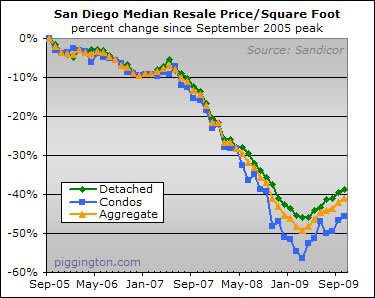
That put the Case-Shiller proxy, discussed in the last post, up 1.4% for the month:
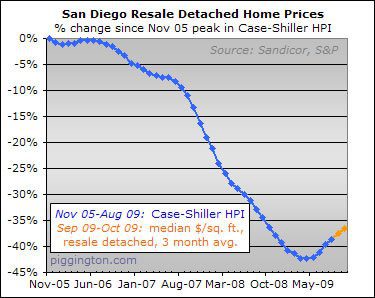
If the proxy is right, home prices as measured by the Case-Shiller index are now up an even 10% from the April low point. In terms of both duration and magnitude, we are well beyond the typical spring rallies that interrupted prior secular downturns.
While displaying the usual volatility, the aggregate plain vanilla median was up a similar amount to the median price per square foot:
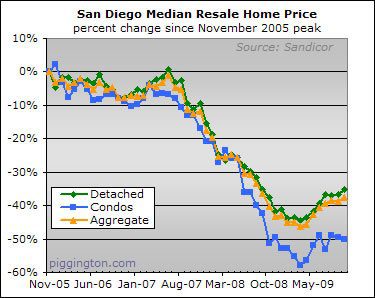
Sales were pretty flat for the month, and on par with last year’s level:
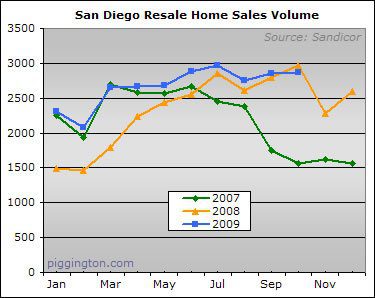
But inventory dropped from its already-depressed levels, hitting multi-year lows:
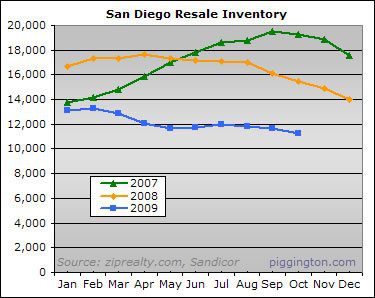
Months of inventory dipped below 4 and also hit new post-boom lows:
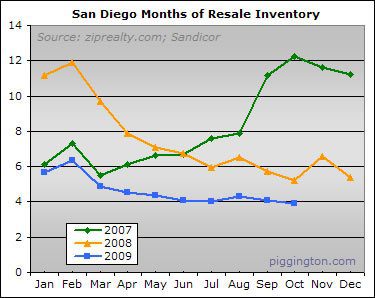
The above chart does not even account for contingent inventory, as defined here, which has accounted for a steadily higher proportion of total inventory in recent months:
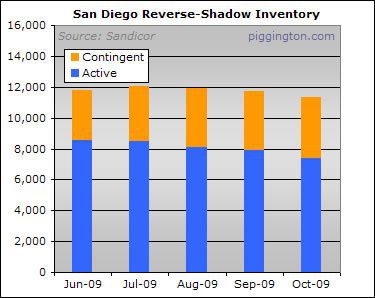
As I’m sure everyone heard, they extended the buyer tax credit and are offering it to certain move-up buyers too. I hope nobody was surprised by this. It continues to be a fight with the structural problems facing the housing market and economy on one side, and the government printing-and-borrowing machine on the other. For now, the printing press is clearly winning.

Actually the extended buyer
Actually the extended buyer credit will likely now have an effect on San Diego, they increased the income cielings. The old credit was almost worthless in So Cal, 75k for singles and 125k or 150k? for couples was too low for many markets in the country, it was a narrow group that could fit under those limits, yet qualify for a house in many so cal areas. Also, those under those limits were more prone to unemployment and reduced income.
I used to discount the effect of the credit in this region because it wasn’t a factor in sticky markets or most markets around here. I didn’t even qualify and joked that if you don’t make 75k pre-tax, even in my 50% off area, you aren’t likely to qualify for a loan on most SFR’s and you are extremely limited in San Diego, even outside the coastal areas.
The new limits of 125k single and 225k couples plus phase out above those levels and that will be a factor, they also allow for move up buyers who have owned a home or are selling and buying.
Those San Diego charts are going to keep churning, perhaps at an even faster pace, welcome to the tax credit San Diego. If bigfoot does exist and the shadow inventory is real, wouldn’t now be a great time for the powers that be to let it go?
Does anyone know if there is
Does anyone know if there is any way to monitor data of “all cash” purchases?
I keep hearing of all cash investors with multi millions, foreign investors, Chinese investors…..etc….from rumors and also from real estate agents. I suspect we can’t measure the effect of these outsiders / rich with no need for finance.
Thanks for the post, Rich.
Thanks for the post, Rich. Can’t say I’m happy about it, but I’m not surprised, either.
for couples was too low for
for couples was too low for many markets in the country, it was a narrow group that could fit under those limits, yet qualify for a house in many so cal areas.
That’s just wrong for San Diego. According to the CS reports 2/3rds of houses sold were for under $420K which is easy to qualify for in those income limits.
While a lot of posters here
While a lot of posters here may not want to accept it, this upturn is for real. It is now many months in duration, it is not erratic but consistent in trend and strength, and given the time lags involved promises to continue for some months. As fiscally imprudent as the tax credit may be, one cannot deny its influence on San Diego’s prices through next spring, especially now that it has been broadened.
Upturns tend to feed on themselves. They are self-reinforcing as everyone–appraisers, lenders, speculators adopt a rosier outlook and make decisions that keep the recovery going.
One last factor is our currently low interest rate environment. The Fed and Obama administration will keep rates low as long as possible, as they have already proved. Sure, the eventual rise in rates can end the rally in house prices. But in the months preceeding the rate hikes, buyers will be urged to buy immediately to lock in these historically low rates, further fueling the upturn.
I wouldn’t get in the way of this train.
What also sucks is that we
What also sucks is that we have already given up some fairly nice property depreciations in many areas. Thus when we finally do start to depreciate again, we have to plow through gains made in the last year just to get to where we were in late 2008.
Go to the beach and check back in around 2011.
I recall the first sign of an
I recall the first sign of an uptick was back in Feb when Rich wrote the article about the Spring bounce:
http://piggington.com/a_spring_bounce_in_seller_delusion
The article noted that the Redfin widget on the sidebar was ticking up.
That little widget, while infuriating, earned my respect.
Which brings me to my point. Said widget is now flattening in terms of list price/sqft and sold price. This is no doubt partly (mostly, even?) the seasonal slowdown that sdr mentioned noticing as well. But might it also reflect a topping out of demand?
The increasing median was
The increasing median was probably more an artifact of the active listing skewing toward a higher end distribution as low end inventory became scarce. I think the flattening you see know is the first sign of capitualation at the higher end.
EconProf wrote:One last
[quote=EconProf]One last factor is our currently low interest rate environment. The Fed and Obama administration will keep rates low as long as possible, as they have already proved. Sure, the eventual rise in rates can end the rally in house prices. But in the months preceeding the rate hikes, buyers will be urged to buy immediately to lock in these historically low rates, further fueling the upturn.
I wouldn’t get in the way of this train.[/quote]
China’s internal games will fail within a year or two, and the internal stress there will lead to dislocations that shock “experts” and terrify global investors. Let me see – I can probably dream up a dozen other scenarios that can serve as the next shoe to drop. IF your train is still running when that shoe does drop I fully expect it will promptly leave the tracks.
The ONLY thing keeping the SD housing market (and, arguably, the entire domestic economy) alive is stimulus $$$. Rich is no doubt correct that politicians will use this tool as long as necessary (provided they can get away with it). Look for yet one more extension of the housing tax credit from April 30th to October 30th, the eve of 2010 elections. I would expect even bigger doses (of yet to be disclosed painkillers) to be delivered between February and May if Christmas shopping tanks again (or not). After October 30th we could find out whether the electorate really does agree with this strategy – that should prove interesting.
Sorry, but the banks are still dead – we’ve tried filling their coffers but they just can’t or won’t move. Globally, stimulus money appears to be “seeking out new bubbles”. How much of it (5%, maybe 10%?) will find its way into the real economy?. The banksters are all pretty happy right now – like the drunks who refuse to leave after a party is clearly over – only problem is taxpayers are refilling the punchbowl (against their will?). I guess we’ll see.
“The ONLY thing keeping the
“The ONLY thing keeping the SD housing market (and, arguably, the entire domestic economy) alive is stimulus $$$.”
I think lower prices have something to do with it as well. I get the feeling that if prices would be 1/2 of what they are now but we still had bidding wars the bears would be saying exactly the same thing.
IMHO, what is keeping the SD housing market alive is the fact that banks are willing to sell some of their inventory at “market clearing” prices. This keeps the buyer pool interested and keeps the market going. We bought our house from a bank and had it not been listed at 50% off the 2005 price we would not have even considered it.
Sure, relatively low prices,
Sure, relatively low prices, media mind games, supply constriction and other gimmicks. They are still betting the farm on housing prices going up. The “housing never goes down” talking points are ok if a few FBs buy it, but for an entire financial system to be structured to that premise is another thing.
Still, it’s on a crumbling foundation with the vicious sawing of the consumer credit contraction and subsequent dwindling pool of willing and able buyers cutting the legs away.
Foresight is obviously not a trait of the banking elite. haha